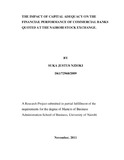The impact of capital adequacy on the Financial performance of commercial banks Quoted at the Nairobi stock exchange
| dc.contributor.author | Suka, Justus N | |
| dc.date.accessioned | 2013-03-12T08:39:34Z | |
| dc.date.issued | 2011-11 | |
| dc.identifier.uri | http://erepository.uonbi.ac.ke:8080/xmlui/handle/123456789/13478 | |
| dc.description.abstract | This research project analyses the impact of capital adequacy on the financial performance of commercial banks quoted at the Nairobi Stock Exchange. Capital provides buffer against losses and thus it ensures safety and soundness of the financial institutions. It is necessary to ensure that the banks have sufficient capital. Capital regulations are therefore put in place to ensure that the banks meet the minimum capital requirements expected of them. Many authors have postulated that capital adequacy has a great impact on the performance of financial institutions. This study provides evidence that supports the central bank’s move to gradually raise the banks capital levels by 2012 and to tightly monitor their operations while at the same time remaining profitable. It therefore shows what impact capital adequacy has on the profitability of the banks. The study relied on secondary data and thus annual reports of the commercial banks were used to provide the much needed information in the study. Ratios and percentages were used to analyze the data collected and regression analysis was used to give insight into the relationship between the variables involved. The main finding in the study is that capital adequacy contributes positively to the profitability of commercial banks and therefore it is paramount for banks to have a sound capital base in order to remain competitive and maintain the confidence of its customers. | en |
| dc.language.iso | en | en |
| dc.publisher | University of Nairobi | en |
| dc.title | The impact of capital adequacy on the Financial performance of commercial banks Quoted at the Nairobi stock exchange | en |
| dc.type | Thesis | en |
| local.publisher | School of Business | en |

